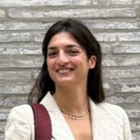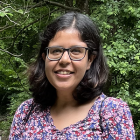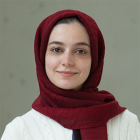Outman Akouissi is a School of Engineering Distinguished Postdoctoral Fellow in mechanical engineering whose research is focused on translational bioelectronics, with an emphasis on minimally invasive technologies such as ingestible and wearable medical devices. As a doctoral student, Outman developed novel peripheral nerve implants for advanced neuromodulation therapies, coinvented hydrogel-based actuation and thin-film 3D microelectrode arrays for neural spheroid electrophysiology, and contributed to the development of integrated wearable systems for the restoration of biomimetic thermal sensations in the phantom hands of amputees. His postdoctoral fellowship will enable him to pursue cutting-edge research in the field of ingestible electronics, specifically a swallowable pill-like device that, once ingested, can modulate the activity of the small intestine, leveraging advanced microfabrication, innovative materials, and creative electromechanical engineering. Outman’s innovative work has the potential to revolutionize patient care, offering personalized treatments for conditions affecting the gastrointestinal tract as well as the nervous system via the gut-brain axis. His ultimate goal is to develop innovative minimally invasive technologies with a focus on clinical translation and lower-cost solutions for deployment in the developing world.
https://engineering.mit.edu/wp-content/uploads/2025/01/Akouissi-Outman_PFPEE_2024-2026_photo.jpg
Website
Outman Akouissi
Mechanical Engineering https://engineering.mit.edu/fellows/outman-akouissi/Paula Cárdenas-Hernández is a School of Engineering Distinguished Postdoctoral Fellow in civil and environmental engineering. In her doctoral work, Paula investigated the degradation of anthropogenic contaminants, such as explosives, in soils and groundwater and developed predictive models for their breakdown under natural and remediation conditions. Her research will focus on how plants and microbes increase the availability of critical nutrients in soils. Specifically, she will investigate how redox-active metabolites released by plant roots affect microbial activity and the availability of iron and phosphorus in soils. Her postdoctoral fellowship will enable her to continue improving our understanding of the naturally occurring processes that control nutrient cycling and contaminant attenuation in soils and groundwater. If engineered appropriately, this knowledge could lead to the development of technologies that enhance fertilizer efficiency and help decrease the impacts of agriculture and other industries on the environment.
https://engineering.mit.edu/wp-content/uploads/2025/01/Cardenas-Hernandez-Paula_PFPEE_2024-2026_photo.jpg
Website
Paula Cárdenas-Hernández
Civil and Environmental Engineering https://engineering.mit.edu/fellows/paula-cardenas-hernandez/Sara Cerasoli is a School of Engineering Distinguished Postdoctoral Fellow in civil and environmental engineering specializing in natural climate solutions and ecohydrology. Her research focuses on optimizing soil, plant, and water resources for climate change mitigation while addressing the interconnected challenges of food security, ecosystem preservation, and water scarcity. Sara’s work integrates ecohydrology, economic modeling, dynamical systems theory, stochastic processes, and optimization methods to tackle complex natural-human system interactions. Her doctoral research examined the biophysical impact of reforestation on cloud formation, water management for agroecosystems, and building natural climate solutions portfolios to maximize the carbon benefit. As a postdoctoral fellow, Sara will advance our understanding of land-atmospheric feedback in natural climate solutions, analyzing their impact on carbon and water cycles and developing optimal policies that harmonize water conservation, food production, and carbon mitigation strategies. Her multidisciplinary approach aims to provide clear definitions of ecohydrological regions suitable for natural climate solutions projects and support effective environmental policymaking.
https://engineering.mit.edu/wp-content/uploads/2025/01/Cerasoli-Sara_PFPEE_2024-2026_photo.png
Website
Sara Cerasoli
Civil and Environmental Engineering https://engineering.mit.edu/fellows/sara-cerasoli/Juan Cervino is an MIT-IBM Distinguished Postdoctoral Fellow in electrical engineering whose research is focused on developing intelligent systems that are efficient under scale, robust to perturbations, and flexible to heterogeneity. Specifically, Juan’s work concentrates on the introduction of requirements to perform machine learning over graphs. As a doctoral student, Juan’s notable achievements included the development of a methodology to train graph neural networks on a sequence of growing graphs that converge to the limit architecture (the graphon) and a novel approach to learning smooth functions over the underlying low-dimensional representation of the data (the manifold). With the support of a postdoctoral fellowship, Juan will pursue several areas of inquiry, including new approaches to large-scale continual learning problems, utilizing manifold smoothness to optimize learning-for-control, and finally, expanding our understanding of collaborative solutions under heterogeneity for the purposes of developing methods of jointly learning shared solutions that improve all the agents in a network. Juan’s innovative research has strong potential to advance the field of machine learning and help deliver next-generation intelligent systems with greatly improved efficiency, strength, and flexibility.
https://engineering.mit.edu/wp-content/uploads/2025/01/Cervino-Juan_PFPEE_2024-2026_photo.jpg
Website
Juan Cervino
Laboratory for Information and Decision Systems https://engineering.mit.edu/fellows/juan-cervino/Mohammad Charara is a School of Engineering Distinguished Postdoctoral Fellow in mechanical engineering whose research explores the mechanics of topological metamaterials with the aims of expanding the design space of these metamaterials, understanding how their mechanics translate into realistic structural specimens, and elucidating their special wave-control properties. In his doctoral research, Mohammad expanded the field on multiple fronts by developing realistic structural lattices that can be physically fabricated, exploring their deformation in 3D, and addressing the dynamical behavior of these materials, particularly with respect to their ability to manipulate acoustic waves. Supported by a postdoctoral fellowship, Mohammad will leverage his expertise and unique perspectives in metamaterials, dynamical systems, and wave propagation to study the mechanics of lattice materials at the nano- and microscales. Mohammad’s work, which applies the latest advances in material physics and topology, has the potential to improve our understanding of the mechanics of metamaterials and deliver new structural materials with broader and superior functionalities.
https://engineering.mit.edu/wp-content/uploads/2025/01/Charara-Mohammad_PFPEE_2024-2026_photo.jpg
Website
Mohammad Charara
Mechanical Engineering https://engineering.mit.edu/fellows/mohammad-charara/Alvin D. Harvey is an MIT-Boeing Distinguished Postdoctoral Fellow and a citizen of the Navajo (Diné) Nation who is focused on Indigenous research methodologies and methods in aeronautics engineering. Alvin’s doctoral thesis was shaped by several goals: co-creating and applying Diné and Indigenous pillars of knowledge in aeronautics and astronautics; developing Indigenous space ethics, astrophilosophy, astrobiology, and shared engineering methodology; and capacity building and pathfinding in systems and complex theory, curriculum design, and bioastronautics. A postdoctoral fellowship will support Alvin’s ongoing work to develop a technical and communicative craft that speaks to the potential academic, strategic, and innovative partnerships between the space community and Native American and Indigenous communities. His objectives include centering Indigenous systems theory and knowledge in sustainable human and satellite space systems engineering, developing the first Indigenous space conference, and training a research team for a space analog mission grounded in Indigenous methodologies. Alvin’s groundbreaking work has the potential to bring innovative practices and transformational knowledge to aerospace engineering and disciplines across science and engineering.
https://engineering.mit.edu/wp-content/uploads/2025/01/Harvey-Alvin_PFPEE_2024-2026_photo.jpeg
Website
Alvin D. Harvey
Aeronautics and Astronautics https://engineering.mit.edu/fellows/alvin-d-harvey/Stewart Isaacs is an MIT-Boeing Distinguished Postdoctoral Fellow in aeronautics and astronautics whose research is focused on decentralized energy systems for a just and sustainable energy transition. Specifically, Stewart seeks to develop novel energy technologies, including decentralized design and production of solar technologies, that are optimized for community and application-specific use. His doctoral research examined the impact of dust and other aerosols on photovoltaic (PV) systems in West Africa. It yielded a novel mitigation method, shape-enhanced aerodynamic dust removal (SEADR), which leverages aerodynamic shapes to passively remove dust by enhancing natural wind removal, thus improving power output. As a postdoctoral fellow, he will expand this work by conducting wind tunnel and field tests of SEADR, developing machine-learning techniques to assess and optimize PV technologies for decentralized applications, and exploring how concepts of energy democracy can be embedded into energy system design. Stewart’s research has strong potential to offer new energy technologies and systems that perform well in local environments while adhering to local values and contextual requirements, thus helping to sustainably meet global needs for affordable, clean energy.
https://engineering.mit.edu/wp-content/uploads/2025/01/Isaacs-Stewart_PFPEE_2024-2026_photo.jpg
Website
Stewart Isaacs
Aeronautics and Astronautics https://engineering.mit.edu/fellows/stewart-isaacs/Cholpisit (Ice) Kiattisewee is a School of Engineering Distinguished Postdoctoral Fellow in biological engineering whose research is focused on antimicrobial resistance (AMR) and engineered living therapeutics, or living organisms crafted for treating human diseases. As a doctoral student, he developed a novel CRISPR-based technology to regulate microbial behavior and metabolism that can function in diverse bacteria. Supported by a postdoctoral fellowship, Ice will pursue a new approach to designing living therapeutics based on non-model organisms equipped with CRISPR-based gene circuits. The goal of this work is to eradicate antimicrobial resistance genes (ARGs) from the virulent organisms hidden in hosts’ microbiome; to that end, he will hone a method to target the ARG-carrying organisms and build a genetic tool capable of eradicating ARGs and preventing their re-acquisition. Ice’s work in novel living therapeutics represents a potentially field-altering breakthrough for synthetic biology. The organism-specific gene editing approach in the microbial consortia could be applied for general microbiome engineering, enabling diverse applications from probiotic engineering for human and animal health to microbial community engineering for bioremediation, bioproduction, and waste upcycling.
https://engineering.mit.edu/wp-content/uploads/2025/01/Kiattisewee_Cholpisit_PFPEE_2024-2026_photo.jpg
Website
Cholpisit (Ice) Kiattisewee
Institute for Medical Engineering and Science https://engineering.mit.edu/fellows/cholpisit-ice-kiattisewee/Yakira Mirabito is a School of Engineering Distinguished Postdoctoral Fellow in mechanical engineering whose research is focused on decision-making in design and the integration of engineering design with organizational management. The goal of her work is to empower engineers to build higher-performance products through innovative design processes that integrate sociotechnical factors. In her doctoral research, Yakira investigated the impacts of various sociotechnical aspects of the design process on design performance, including concept generation, concept selection, design communication, and team dynamics. As a postdoctoral fellow, she aims to quantify the impacts of hierarchy (i.e., power and status) on decision-making, enhance the effectiveness of design-rational communication, and integrate these findings into design education and practice. By building a greater understanding of decision-making in engineering design and leveraging that knowledge to develop innovative design support tools, Yakira’s research has strong potential to improve design and product performance while enhancing equity and inclusion in engineering, industry, and society at large.
https://engineering.mit.edu/wp-content/uploads/2025/01/Mirabito-Yakira_PFPEE_2024-2026_photo.jpg
Website
Yakira Mirabito
Mechanical Engineering https://engineering.mit.edu/fellows/yakira-mirabito/Bryn Morgan is a Department of Civil and Environmental Engineering Distinguished Postdoctoral Fellow in civil and environmental engineering whose research focuses on ecohydrology, surface-atmosphere interactions, and the effects of water limitation on terrestrial ecosystems. Specifically, Bryn investigates how dryland plants respond to water stress and how these responses shape ecosystem structure, function, and resilience to climate change. In her doctoral research, she developed a novel, drone-based approach for estimating plant water use from thermal imagery and meteorological data. She used this approach to characterize how fluctuations in water demand and supply alter energy and water fluxes from desert trees. As a postdoctoral fellow, she will investigate how adaptations to water stress affect water, carbon, and energy fluxes across scales to better anticipate how changing water resources will impact ecosystem structure, function, and resilience to water stress. Bryn’s work has excellent potential to offer valuable insights into how changes in water availability will affect ecosystem water use. This knowledge could contribute to a broader understanding of the impacts of climate change on terrestrial ecosystems and Earth system functioning and support the development of effective solutions.
https://engineering.mit.edu/wp-content/uploads/2025/01/Morgan-Bryn_PFPEE_2024-2026_photo.jpg
Website
Bryn Morgan
Civil and Environmental Engineering https://engineering.mit.edu/fellows/bryn-morgan/Daniel Mukasa is an MIT-Takeda Distinguished Postdoctoral Fellow whose research is focused on computational design and experimental fabrication of biomedical materials. In the past, Daniel designed affordable medical devices to monitor conditions such as Covid-19, diabetes, metabolic syndrome, and diseases like phenylketonuria (PKU). A central aim of his work is to optimize methods and tools for detecting low concentrations of biomarkers in sweat. His doctoral research included the creation of QuantumDock, a computational framework for the automated creation of molecularly imprinted polymers, which enabled the development of a novel wearable device for monitoring PKU. He also made significant contributions to NutriTrek, a wearable, electrochemical-sensing patch for metabolite monitoring, applicable for several diseases and nutritional states, including Covid-19 and diabetes. As a postdoctoral fellow, Daniel will expand his use of computational methods from diagnostics to therapeutics. By combining powerful quantum calculations and machine-learning strategies, Daniel’s research aims to design novel therapeutic products for disease treatment.
https://engineering.mit.edu/wp-content/uploads/2025/01/Mukasa-Daniel_PFPEE_2024-2026_photo.png
Website
Daniel Mukasa
Chemical Engineering Mechanical Engineering https://engineering.mit.edu/fellows/daniel-mukasa/Vanesa Muñoz Perales is a School of Engineering Distinguished Postdoctoral Fellow in materials science and engineering whose research is focused on the accelerated discovery of new soft energy materials for electrochemical energy storage and the development of competitive next-generation batteries to support the energy transition at low economic, environmental, and ethical cost. In her doctoral research, Vanesa investigated mass transport phenomena in porous electrodes and alternative cell architectures to increase the efficiency of flow batteries for large-scale energy storage. As a postdoctoral fellow, she will explore the potential of engineering new electrolyte and electrode materials from the bottom up to improve ionic and electronic transport and subsequent performance in batteries. She will pursue a new approach by bridging polymer science, fundamental electrochemistry, and automated high-throughput platforms. Her goal is to establish a new line of research in nanostructured soft energy materials for high-power and low-cost beyond-lithium batteries to address the global need for decarbonizing the energy system. Vanesa’s research has strong potential to deliver new energy storage materials and transformative technologies to address the global need for clean, affordable energy.
https://engineering.mit.edu/wp-content/uploads/2025/01/Munoz-Perales-Vanesa_PFPEE_2024-2026_photo.png
Website
Vanesa Muñoz Perales
Research Laboratory of Electronics https://engineering.mit.edu/fellows/vanesa-munoz-perales/Jigyasa Nigam is an MIT-IBM Distinguished Postdoctoral Fellow in electrical engineering and computer science whose research is focused on machine learning for atomistic systems. Specifically, Jigyasa investigates how the mathematical structure of a machine-learning model interacts with the inherent constraints of a physical problem, such as symmetry, smoothness, and conservation laws. Her prior work has tackled core challenges in the field, including how to efficiently include higher-body-order effects and equivariance into machine-learning representations and their connection with message-passing frameworks. She also worked on applying these methods to model effective single-particle electronic Hamiltonians. As a postdoctoral fellow, Jigyasa will pursue her goal of modeling symmetry-breaking phenomena and integrating the modeling of dissipative and open quantum systems into this comprehensive framework. This work, in addition to yielding valuable insights into quantum chemistry, could enable the description of materials crucial for energy storage and pharmaceuticals. Jigyasa’s research holds great potential for advancing approaches in point-cloud modeling, offering transformative solutions across multiple spheres, from sustainable energy to health care and next-generation technologies in quantum computing.
https://engineering.mit.edu/wp-content/uploads/2025/01/Nigam-Jigyasa_PFPEE_2024-2026_photo.png
Website
Jigyasa Nigam
Research Laboratory of Electronics https://engineering.mit.edu/fellows/jigyasa-nigam/Selma Piranej is an MIT-Northpond Distinguished Postdoctoral Fellow in biological engineering whose research aims to develop nanoscale DNA-based biosensing applications for the diagnosis and treatment of diseases, with a particular emphasis on robust, affordable nanotechnologies for limited-resource environments. As a doctoral student, Selma developed a novel platform for viral sensing that integrates a rolling DNA motor; this non-equilibrium process is a stark departure from current approaches and could have potentially transformative impacts on chemical sensing. In response to the Covid-19 pandemic, she pivoted her focus to developing inexpensive, rapid, and at-home SARS-CoV-2 diagnostics that apply her innovations. As a postdoctoral fellow, Selma will pursue her long-term goal to develop a new framework for chemical sensing that takes advantage of far-from-equilibrium systems and replicates a hallmark of living systems: the ability to autonomously detect chemical inputs, process this information, and respond by triggering locomotion. Selma’s research represents an exciting step toward the creation of next-generation molecular robotics and chemical sensors with the potential to revolutionize the diagnosis and treatment of human disease.
https://engineering.mit.edu/wp-content/uploads/2025/01/Piranej-Selma_PFPEE_2024-2026_photo.jpg
Website
Selma Piranej
Biological Engineering https://engineering.mit.edu/fellows/selma-piranej/Amanda Elyssa Ruiz is an MIT-Northpond Distinguished Postdoctoral Fellow in biological engineering whose research interests are in immunology, vaccine development, and global health. Specifically, Amanda’s work concentrates on the development of novel vaccine candidates against flaviviruses, a family of RNA viruses—including Dengue, Zika, and West Nile viruses—that lead to significant morbidity and mortality on a global scale. By leveraging protein engineering strategies alongside platforms to elucidate evolutionary antibody dynamics in humans and natural animal reservoirs, Amanda hopes to shed light on how these viruses have evaded the mammalian immune system for centuries. In her doctoral research, Amanda studied protective immune responses to the neglected tropical disease schistosomiasis. A postdoctoral fellowship will support her ongoing work to develop platforms and techniques to manipulate immune recognition, enhance immune responses using nanotechnologies, and perturb the host-pathogen interface. The broader goals of Amanda’s research are to contribute to the understanding of adaptive immune responses implicated in neglected tropical diseases and to develop preventative and therapeutic solutions for infectious diseases. Her work holds great promise to advance affordable vaccine design, thus improving global health.
https://engineering.mit.edu/wp-content/uploads/2025/01/Ruiz-Amanda_Elyssa_PFPEE_2024-2026_photo.jpg
Website
Amanda Elyssa Ruiz
Biological Engineering https://engineering.mit.edu/fellows/amanda-elyssa-ruiz/Silvia Sellán is a School of Engineering Distinguished Postdoctoral Fellow in electrical engineering and computer science whose research seeks to broaden the application realm of computer graphics by quantifying the uncertainty of 3D geometric tasks. Their research has yielded groundbreaking results in geometry processing, computer graphics, and related fields. The primary focus of Silvia’s research is reinterpreting common geometric synthesis frameworks like modeling and reconstruction from a statistical perspective, an approach which can greatly improve the accuracy of established methods and enable completely new, uncertainty-aware algorithms with valuable applications in medicine, security, autonomous driving and more. With the support of a postdoctoral fellowship, Silvia will utilize this new stochastic perspective in particular applications, such as quantifying possible use-case-specific properties of an object and communicating this uncertainty to humans such as architects or surgeons, and artificial decision-makers such as autonomous vehicles. Silvia’s research is delivering transformational approaches and tools and helping to expand computer graphics far beyond traditional entertainment applications and into decision-making in a wide range of industries, from autonomous vehicles to healthcare. Silvia accepted a tenure track faculty position at Columbia University and will be departing the program in the summer of 2025.
https://engineering.mit.edu/wp-content/uploads/2025/01/Sellan-Silvia_PFPEE_2024-2026_photo.jpg
Website
Silvia Sellán
Computer Science and Artificial Intelligence Laboratory https://engineering.mit.edu/fellows/silvia-sellan/Athena Taymourtash is a School of Engineering Distinguished Postdoctoral Fellow who develops machine learning methods for optimized acquisition and robust analysis of medical images. Her research interests lie at the intersection of computer science and neuroimaging, with a specific emphasis on computational modeling, computer vision, and machine learning applied to prenatal imaging and healthcare challenges. In her doctoral research, Athena developed novel algorithms for fetal magnetic resonance imaging (MRI) analysis, particularly in motion tracking, super-resolution, and real-time correction to improve diagnostic imaging. This postdoctoral fellowship will enable her to expand her efforts in advancing fetal MRI technology by exploring new machine learning approaches to enhance image quality, reduce scan times, and improve diagnostic accuracy. Athena’s work has the potential to bridge cutting-edge computational techniques with clinical applications, contributing to improved outcomes in maternal-fetal healthcare, and at a broader level to expand the use of innovative machine learning approaches in healthcare.
https://engineering.mit.edu/wp-content/uploads/2025/01/Taymourtash-Athena_Postdoctoral-Fellow_Headshot.png
Website